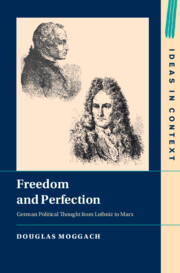Refine search
Actions for selected content:
55 results
Chapter 1 - The “Aristotle of Königsberg”?
-
-
- Book:
- The Aristotelian Kant
- Published online:
- 15 December 2025
- Print publication:
- 22 January 2026, pp 16-34
-
- Chapter
- Export citation
Chapter 8 - Mirroring through Intuition
-
- Book:
- Kant and the Power of Perception
- Published online:
- 27 November 2025
- Print publication:
- 11 December 2025, pp 246-270
-
- Chapter
- Export citation
Chapter 7 - Suárez on Distinctions
- from Part II - Being, Its Properties, and Ancillary Notions
-
-
- Book:
- Suárez's <i>Metaphysical Disputations</i>
- Published online:
- 13 October 2025
- Print publication:
- 30 October 2025, pp 123-142
-
- Chapter
- Export citation
6 - The Grounding Argument
-
- Book:
- Kant's Metaphysics of the Will
- Published online:
- 06 November 2025
- Print publication:
- 09 October 2025, pp 137-179
-
- Chapter
- Export citation
Chapter 2 - Leibniz
-
- Book:
- Freedom and Perfection
- Published online:
- 25 July 2025
- Print publication:
- 14 August 2025, pp 29-57
-
- Chapter
- Export citation
Chapter 1 - Thinking Freedom
-
- Book:
- Freedom and Perfection
- Published online:
- 25 July 2025
- Print publication:
- 14 August 2025, pp 1-28
-
- Chapter
- Export citation

Freedom and Perfection
- German Political Thought from Leibniz to Marx
-
- Published online:
- 25 July 2025
- Print publication:
- 14 August 2025
Chapter 2 - On Causes and Giving an Account
-
- Book:
- Reading Aquinas's Five Ways
- Published online:
- 05 June 2025
- Print publication:
- 19 June 2025, pp 30-54
-
- Chapter
- Export citation
Kant’s Critique of the Ontological Argument: Comments on Ian Proops’s The Fiery Test of Critique
-
- Journal:
- Kantian Review / Volume 29 / Issue 2 / June 2024
- Published online by Cambridge University Press:
- 21 May 2024, pp. 277-287
- Print publication:
- June 2024
-
- Article
-
- You have access
- Open access
- HTML
- Export citation
5 - Infinity, Discursivity, Givenness
-
- Book:
- Intuition in Kant
- Published online:
- 07 March 2024
- Print publication:
- 14 March 2024, pp 132-172
-
- Chapter
- Export citation
Leibniz's Moral Psychology of an Evil Person
-
- Journal:
- Dialogue: Canadian Philosophical Review / Revue canadienne de philosophie / Volume 64 / Issue 2 / August 2025
- Published online by Cambridge University Press:
- 17 November 2023, pp. 377-399
-
- Article
- Export citation
4 - Spinoza, Cudworth, Shaftesbury, and Leibniz
-
- Book:
- Modern Moral Philosophy
- Published online:
- 10 June 2023
- Print publication:
- 15 June 2023, pp 111-164
-
- Chapter
- Export citation
In Leibniz’s Wake: Rationalist Paradise Lost
-
- Journal:
- Canadian Journal of Philosophy / Volume 52 / Issue 5 / July 2022
- Published online by Cambridge University Press:
- 22 December 2022, pp. 517-539
-
- Article
- Export citation
10 - Mental Activity: The German Tradition
- from Part I - Psychology’s Historical Foundations
-
- Book:
- History and Systems of Psychology
- Published online:
- 04 November 2022
- Print publication:
- 17 November 2022, pp 184-201
-
- Chapter
- Export citation
Chapter 11 - The Resonant Principle of Reason
- from Part IV - Logical Principles and the Question of Being
-
-
- Book:
- Heidegger on Logic
- Published online:
- 15 September 2022
- Print publication:
- 22 September 2022, pp 221-239
-
- Chapter
- Export citation
7 - The Sea of Language
- from Part III - The Second Mother Tongue as a (M)other Tongue and the Return to the Body
-
-
- Book:
- Language Learning and the Mother Tongue
- Published online:
- 16 June 2022
- Print publication:
- 30 June 2022, pp 123-136
-
- Chapter
- Export citation
Chapter 1 - Mechanisms, Then and Now
- from Part I - Ideas of Mechanism
-
- Book:
- Mechanisms in Science
- Published online:
- 09 June 2022
- Print publication:
- 23 June 2022, pp 15-39
-
- Chapter
- Export citation
III.3 - The General Scholium
- from Part III - Isaac Newton and the Emancipation of Natural Philosophy from Metaphysics
-
- Book:
- The Kingdom of Darkness
- Published online:
- 23 March 2022
- Print publication:
- 31 March 2022, pp 703-765
-
- Chapter
- Export citation
LEIBNIZ ON BODIES AND INFINITIES: RERUM NATURA AND MATHEMATICAL FICTIONS
- Part of
-
- Journal:
- The Review of Symbolic Logic / Volume 17 / Issue 1 / March 2024
- Published online by Cambridge University Press:
- 03 December 2021, pp. 36-66
- Print publication:
- March 2024
-
- Article
-
- You have access
- Open access
- HTML
- Export citation
7 - Kant’s Reworking of the Theory of Magnitudes
- from Part II - Kant’s Theory of Magnitudes, Intuition, and Measurement
-
- Book:
- Kant's Mathematical World
- Published online:
- 21 October 2021
- Print publication:
- 28 October 2021, pp 197-218
-
- Chapter
- Export citation
